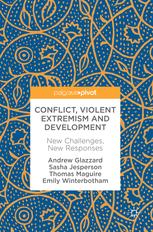

Most ebook files are in PDF format, so you can easily read them using various software such as Foxit Reader or directly on the Google Chrome browser.
Some ebook files are released by publishers in other formats such as .awz, .mobi, .epub, .fb2, etc. You may need to install specific software to read these formats on mobile/PC, such as Calibre.
Please read the tutorial at this link: https://ebookbell.com/faq
We offer FREE conversion to the popular formats you request; however, this may take some time. Therefore, right after payment, please email us, and we will try to provide the service as quickly as possible.
For some exceptional file formats or broken links (if any), please refrain from opening any disputes. Instead, email us first, and we will try to assist within a maximum of 6 hours.
EbookBell Team

4.1
60 reviewsThis edited volume examines the implications for international development actors of new kinds of terrorism taking place in civil conflicts. The threat from terrorism and violent extremism has never been greater – at least in the global South where the vast majority of violent extremist attacks take place. Some of the most violent extremist groups are also parties to civil conflicts in regions such as the Middle East and the Horn of Africa. But are these groups – especially the violent Islamists which constitute the greatest current threat – qualitatively different from other conflict actors? If they are, what are the implications for development practitioners working in war zones and fragile or poverty-afflicted countries? This study aims to answer these questions through a combination of theoretical enquiry and the investigation of three case studies – Kenya, Nigeria, and Iraq/Syria. It aims to illuminate the differences between violent Islamists and other types of conflict actor, to identify the challenges these groups pose to development practice, and to propose a way forward for meeting these challenges.